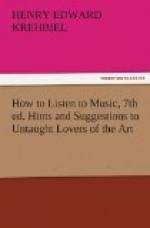of art, as it is of the mere time-server who aims
only at tickling the popular ear. The reason
is obvious to a little close thinking: Ignorance
is at once a safeguard against and a promoter of conservatism.
This sounds like a paradox, but the rapid growth of
Wagner’s music in the admiration of the people
of the United States might correctly be cited as a
proof that the statement is true. Music like
the concert fragments from Wagner’s lyric dramas
is accepted with promptitude and delight, because
its elements are those which appeal most directly
and forcibly to our sense-perception and those primitive
tastes which are the most readily gratified by strong
outlines and vivid colors. Their vigorous rhythms,
wealth of color, and sonority would make these fragments
far more impressive to a savage than the suave beauty
of a symphony by Haydn; yet do we not all know that
while whole-hearted, intelligent enjoyment of a Haydn
symphony is conditioned upon a considerable degree
of culture, an equally whole-hearted, intelligent
appreciation of Wagner’s music presupposes a
much wider range of sympathy, a much more extended
view of the capabilities of musical expression, a
much keener discernment, and a much profounder susceptibility
to the effects of harmonic progressions? And
is the conclusion not inevitable, therefore, that on
the whole the ready acceptance of Wagner’s music
by a people is evidence that they are not sufficiently
cultured to feel the force of that conservatism which
made the triumph of Wagner consequent on many years
of agitation in musical Germany?
[Sidenote: "Ahead of one’s time."]
In one case the appeal is elemental; in the other
spiritual. He who wishes to be in advance of
his time does wisely in going to the people instead
of the critics, just as the old fogy does whose music
belongs to the time when sensuous charm summed up
its essence. There is a good deal of ambiguity
about the stereotyped phrase “ahead of one’s
time.” Rightly apprehended, great geniuses
do live for the future rather than the present, but
where the public have the vastness of appetite and
scantness of taste peculiar to the ostrich, there it
is impossible for a composer to be ahead of his time.
It is only where the public are advanced to the stage
of intelligent discrimination that a Ninth Symphony
and a Nibelung Tetralogy are accepted slowly.
[Sidenote: The charlatan.]
[Sidenote: Influencing the critics.]
Why the charlatan should profess to despise the critic
and to pay homage only to the public scarcely needs
an explanation. It is the critic who stands between
him and the public he would victimize. Much of
the disaffection between the concert-giver and the
concert-reviewer arises from the unwillingness of the
latter to enlist in a conspiracy to deceive and defraud
the public. There is no need of mincing phrases
here. The critics of the newspaper press are besieged
daily with requests for notices of a complimentary




